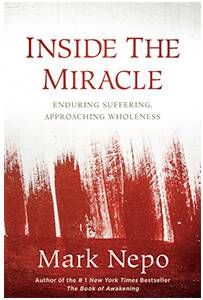Why Having Cancer Made Me Stop Rushing
Author Mark Nepo says slowing down will lead us back to empathy
The following is adapted from Inside the Miracle: Enduring Suffering, Approaching Wholeness by Mark Nepo. Published in November 2015 by Sounds True.
One of the great transforming passages in my life was having cancer in my mid-30s. This experience unraveled the way I see the world. It scoured my lens of perception, landing me in a deeper sense of living. There are certain experiences that reform us, as if God’s a tireless blacksmith who, against our pleading, forges the metal in us, though it takes years for our heart and mind to cool from the pounding. My journey with cancer was how I was forged.
If I learned anything from having cancer, it’s that unless there’s a physical need — such as needing air to breathe or needing to stop a wound from bleeding — there’s no reason to rush, no matter the level of urgency being showered on us by others.
It Is Up to Us
Each of us is driving our own train, and the trick is not to go so fast that everything blurs and yet to go steadily enough that we get somewhere; though there are times when not going at all is tantamount to arriving.
The violent speed of our age doesn’t help. In a world so mobile and transient we can wake up married in Atlanta and go to sleep divorced in Fort Worth; the game has become who can snatch a mouthful of seed and be on their way first. In a world where sophistication means we show nothing, the mind becomes as cold as a camera shutter, opening and closing rapidly so as not to let too much in. In a world that makes a fortress of objectivity, we avoid the one frontier that returns us to first-hand experience: our ability to care. In a world that deems simplicity as dull, patience as slothful, and compassion as entangling, we give up inroads to our very core if we can no longer empathize.
Stopping Is Not Enough
Succumbing to speed is a form of isolation that makes us feel inadequate, because we’re always falling short, always catching up. But stopping alone is not entering stillness, because stopping alone does not let who we are merge with where we are. Still, to stop and slow down is a beginning, because we start to find what matters when we stop rushing.

Rushing can be defined as any instance in which we move faster than we need to. As soon as we begin to rush, whether hurried by an overbearing parent to the dinner table or harried into a career choice by an artificial deadline of our own making, we become estranged from ourselves; that is, a hollow forms between our inner self and the self that’s rushing through the world. Once divided from our sense of aliveness, we lose contact with that kinetic border called wonder. This estrangement from our aliveness is the beginning of alienation. And though there are many ways to feed our estrangement, rushing out of congruence – out of being where we are – is as sure a path as any to the netherworld of half-living.
‘The Temporary Ease of Hiding’
Throughout our lives, we struggle with the temporary ease of hiding and the pain of never surfacing: hiding our feelings of insignificance in our ambitions for a life of fame, hiding our confusions at the complexities of life in principles we hope will swallow them, hiding our pain of honest suffering in a resignation that stills the heart. And all the while our experience of what is real gets away from us.
But if we were to hide who we are in who we are, like hiding a body in its skin, if we were to let things be and not make over their impact on us, all hiding would evaporate and the constancy of our self would be final, real and unequivocal in its majesty of flaws.
A Different Way to Live
When we can manage to live our own life, letting nothing real slip away, the larger ocean of life draws us with a magnetism all its own, the way a fish is drawn by light to a surface it can't imagine.
If we dare not to rush, not to live any faster than we are ignited from within, if we dare to slow into true presence the many times we do rush, if we dare to hear each other’s needs, if we dare to accept the discomfort of not knowing what to do until it becomes the comfort of a perennial question – we might find that one life in its unmitigated fullness may be more than enough.
Copyright © 2015 by Mark Nepo.

